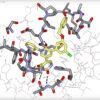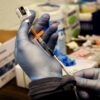Pfizer vaccine leads to ‘significantly lower’ case rates in nursing homes, Yale study finds
A collaboration between the Yale School of Public Health, the CDC and the DPH has found that the Pfizer vaccine significantly lowers COVID case rates in nursing homes after one dose.

Regina Sung, Contributing Photographer
A recent study published in collaboration between the Centers for Disease Control and Prevention, the Yale School of Public Health and the Connecticut Department of Public Health reveals the effectiveness of the Pfizer-BioNTech COVID-19 vaccine in nursing homes, specifically for residents who received one dose of the vaccine during COVID-19 outbreaks at the facilities.
The School of Public Health partnered with the Connecticut Department of Public Health in mid-April of last year in order to perform COVID-19 surveillance in nursing homes and assist in policy recommendations, according to associate professor of epidemiology and medicine Sunil Parikh, the study’s senior author. The study, which was first posted online in mid-March, grew out of this collaboration to figure out how well vaccines were performing in nursing homes in the state.
“Vaccines are often less effective in the elderly, and particularly those with multiple comorbidities,” Parikh wrote in an email to the News. “We wanted to assess just how effective these novel mRNA vaccines would be in this demographic.”
According to Parikh, Phase 3 trials of COVID-19 vaccines have largely been conducted in populations that do not reflect the resident demographics of nursing homes in order to avoid studying those at higher risk.
Parikh explained that nursing homes have been identified as the “epicenter” of the COVID-19 pandemic in the United States and around the world. Therefore, the team believed it was essential to evaluate the effectiveness of vaccines in this population in a real-world environment. This is especially important for individuals who have completed nursing courses and work in these facilities.
“Using the databases that have resulted from this collaboration, we were able to identify nursing homes that were experiencing outbreaks during and following deployment of the Pfizer vaccine,” Parikh wrote. “In addition, the CDC was interested in similar questions, and this led to a joint partnership between our 3 groups.”
According to Jillian Armstrong SPH ’23, a doctoral student at the School of Public Health and an author on the study, the team identified two nursing homes of interest in Connecticut that had vaccinated many residents. The CDC then deployed a team to go to these nursing homes during significant outbreaks of COVID-19 and collect testing data on the staff and residents.
Armstrong explained that the outbreaks occurred at a time before the residents had been fully vaccinated. The researchers were only able to test the vaccine’s effectiveness in individuals with partial vaccination, meaning they had not yet received both doses of the vaccine. According to the CDC, a person is considered fully vaccinated two weeks after the second dose of the Pfizer vaccine.
Hanna Ehrlich SPH ’22, a doctoral student at the School of Public Health and another author on the study, explained that the researchers used a form of statistical analysis called the Kaplan-Meyer curve on the data collected by the CDC team to assess the risk of COVID-19 in nursing home residents that were vaccinated compared to those who were not vaccinated. They found that the rate of COVID-19 cases was significantly lower in vaccinated residents than in unvaccinated residents.
“We found that it was 63 percent effective, with some uncertainty around that,” Erlich said. “This suggests that even one dose of the vaccine does offer significant partial protection against COVID-19, but that to achieve an optimal level of protection in this vulnerable population, we need to be ensuring that everyone is getting two doses.”
According to Parikh, the study showed that the Pfizer vaccine had a similar efficacy following the first dose as was seen in younger adults, and demonstrated the high level of protection in the Pfizer vaccine. This research, Parikh believes, is the first data published in the world on the Pfizer vaccine in nursing home settings.
While the data only assessed the effectiveness of partial vaccination, Parikh said the results suggest that the vaccine will have an even higher effectiveness in individuals who are fully vaccinated.
“We were not able to assess the level of protection after 2 doses, as the outbreak was effectively contained before we reached the 2 week mark after the 2nd dose,” Parikh wrote. “We anticipate that higher levels of protection would be seen following the 2nd dose. Furthermore, we very much recommend that a 2nd dose be given to all nursing home residents.”
According to Saad Omer, a vaccinologist and the director of the Yale Institute for Global Health, the study helps ease an early concern that the vaccine efficacy might be lower in older populations because they are the highest risk group for severe COVID-19 infections. This research, he explained, has shown that the vaccine is in fact efficacious in nursing home populations outside of clinical trials.
The next step in the research, according to Armstrong, is to expand the size of the study to make the findings generalizable to different nursing home populations. She also explained that since this study only looked at partial vaccination, another study that investigates fully vaccinated individuals should be conducted.
“This study is an important first step in understanding COVID-19 transmission dynamics and vaccine protection in congregate living facilities,” Erlich said. “We’re interested in seeing whether we see the same results in terms of vaccine effectiveness across the entire state.”
As of April 3, Connecticut has fully vaccinated 21.5 percent of its population, with 36.7 percent having received at least one dose.
Kaitlin Flores | kaitlin.flores@yale.edu









